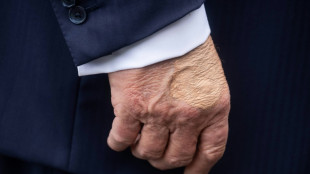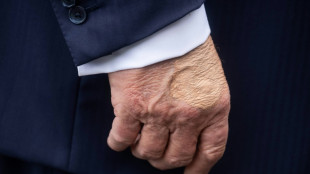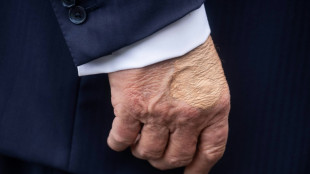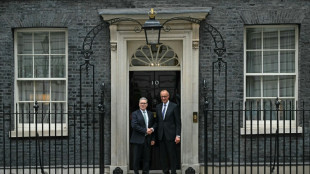
-
 Gulf Air orders 12 Boeing 787 Dreamliners
Gulf Air orders 12 Boeing 787 Dreamliners
-
Japan rice prices double, raising pressure on PM

-
 'A trap' - Asylum seekers arrested after attending US courts
'A trap' - Asylum seekers arrested after attending US courts
-
England's Wiegman hails 'one of a kind' Bronze after Euros shootout triumph

-
 El Salvador rights group says forced out by Bukele 'repression'
El Salvador rights group says forced out by Bukele 'repression'
-
US may revise hormone replacement therapy warnings

-
 US House passes landmark crypto measures in win for Trump
US House passes landmark crypto measures in win for Trump
-
Trump diagnosed with vein issue after leg swelling and hand bruising

-
 England reach Euro 2025 semis after shootout win over Sweden
England reach Euro 2025 semis after shootout win over Sweden
-
Netflix profits surge off ads, higher subscription prices

-
 US stocks end at fresh records as markets shrug off tariff worries
US stocks end at fresh records as markets shrug off tariff worries
-
British Open round 1: Who said what

-
 Former Springbok Ackermann succeeds White as Bulls coach
Former Springbok Ackermann succeeds White as Bulls coach
-
Milei steps up attacks on media as election nears

-
 Netflix profits surge 45% off higher subscription prices
Netflix profits surge 45% off higher subscription prices
-
McIlroy pushed to solid British Open start by home support

-
 Israel PM voices regret after three killed at Catholic church in Gaza
Israel PM voices regret after three killed at Catholic church in Gaza
-
Scheffler makes bright British Open start, McIlroy three shots back

-
 Fraud probe opened into Mbappe payments to police officers
Fraud probe opened into Mbappe payments to police officers
-
Trump diagnosed with vein issue after leg swelling, hand bruising

-
 US authorizes Juul to market vaping products
US authorizes Juul to market vaping products
-
Pacquiao, 46, eyes comeback upset in Barrios showdown

-
 Austrian space diver Felix Baumgartner was 'born to fly'
Austrian space diver Felix Baumgartner was 'born to fly'
-
Slashed US aid showing impact, as Congress codifies cuts

-
 Spain's Bonmati 'grateful' for Euros bid after meningitis scare
Spain's Bonmati 'grateful' for Euros bid after meningitis scare
-
'Benign' vein issue behind Trump's swollen legs: White House

-
 Afghan data breach unmasked UK spies, special forces: reports
Afghan data breach unmasked UK spies, special forces: reports
-
US health experts reassess hormone replacement therapy risks

-
 France court orders release of Lebanese militant after 40 years in jail
France court orders release of Lebanese militant after 40 years in jail
-
Goodbye 'Downton Abbey' auction and UK exhibition announced

-
 Soaked Scheffler battles elements to make solid British Open start
Soaked Scheffler battles elements to make solid British Open start
-
Ons Jabeur announces break from tennis 'to rediscover joy of living'

-
 UK, Germany vow to tackle people smuggling gangs
UK, Germany vow to tackle people smuggling gangs
-
Zuckerberg settles lawsuit over Cambridge Analytica scandal

-
 Global markets rise as Trump weighs future of Fed boss
Global markets rise as Trump weighs future of Fed boss
-
Syria troops quit Druze heartland after violence leaves over 500 dead

-
 TikTok Germany moderators raise alarm over layoff plans
TikTok Germany moderators raise alarm over layoff plans
-
Pogacar retakes Tour de France lead in crushing mountain win

-
 Women's marathon world record holder Chepngetich suspended for doping suspicions
Women's marathon world record holder Chepngetich suspended for doping suspicions
-
EU readies retaliatory list targeting US services

-
 'Back in love': MotoGP champion Martin stays with Aprilia
'Back in love': MotoGP champion Martin stays with Aprilia
-
Israeli strike on Gaza's only Catholic church kills three

-
 'I'm not an old guy': Usyk says age won't matter in Dubois bout
'I'm not an old guy': Usyk says age won't matter in Dubois bout
-
Fan energy key for Swiss in Euros clash with Spain, says Maritz

-
 'Like a dream': Druze reunited across Golan Heights buffer zone
'Like a dream': Druze reunited across Golan Heights buffer zone
-
US health experts to reassess hormone replacement therapy risks

-
 Scheffler makes bright British Open start before McIlroy takes centre stage
Scheffler makes bright British Open start before McIlroy takes centre stage
-
El Salvador rights group says forced into exile by Bukele crackdown

-
 Shock and sadness as Tomorrowland music festival opens after fire
Shock and sadness as Tomorrowland music festival opens after fire
-
Napoli sign Dutch international forward Lang


US House passes landmark crypto measures in win for Trump
The US House of Representatives on Thursday passed three landmark cryptocurrency bills, fulfilling the Trump administration's commitment to the once-controversial industry.
Lawmakers easily approved the CLARITY Act, which aims to establish a clearer regulatory framework for cryptocurrencies and other digital assets.
The bill is designed to clarify industry rules and divide regulatory authority between the Securities and Exchange Commission (SEC) and the Commodity Futures Trading Commission (CFTC).
It will now advance to the Senate, where Republicans hold a slim majority.
House legislators also readily passed the GENIUS Act, which codifies the use of stablecoins -- cryptocurrencies pegged to stable assets like the US dollar or US bonds.
This bill is expected to go directly to President Trump for his signature to become law.
The Senate passed the GENIUS Act last month, and it sets requirements such as mandating that issuers hold reserves of assets equal in value to their outstanding cryptocurrency.
"This historic legislation will bring our payment system into the 21st century. It will ensure the dominance of the US dollar. It will increase demand for US Treasuries," said Senator Bill Hagerty, the measure's sponsor in the Senate.
This wave of legislation follows years of skepticism towards crypto, driven by the belief that the sector, born from bitcoin's success, should be tightly controlled and kept separate from mainstream investors.
However, after crypto investors contributed millions of dollars to his presidential campaign last year, Trump reversed his previous doubts about the industry.
He even launched a Trump meme coin and other ventures as he prepared for his return to the White House and hosted a gala dinner for the coin's top buyers once he was in office.
And according to the Financial Times, Trump is now preparing to open the $9 trillion US retirement market to cryptocurrency investments as well as gold, and private equity.
Notably, both the CLARITY Act and the GENIUS Act garnered significant bipartisan support, with Democrats also having seen an increase in lobbying and contributions from the crypto industry.
"It's critically important we bring more certainty to the marketplace with clear rules of the road," said congressman Josh Gottheimer, a Democrat who supported the bills.
Since taking office, Trump has made several moves to support the crypto sector, including appointing crypto advocate Paul Atkins to lead the SEC.
He also established a federal "Strategic Bitcoin Reserve" to audit the government's bitcoin holdings, primarily accumulated through law enforcement's judicial seizures.
Forbes magazine estimates that the president's foray into the crypto business has doubled his wealth to $5.3 billion in just one year.
In a largely partisan vote, the Republican-led House also passed the Anti-CBDC Surveillance State Act.
It aims to block the issuance of a central bank digital currency (CBDC) -- a digital dollar issued by the US Federal Reserve -- even if there currently are no plans for such an endeavor.
Republicans argue that a CBDC could enable the federal government to monitor, track, and potentially control private citizens' financial transactions, thereby undermining privacy and civil liberties.
Passage of this measure in the Senate is far from guaranteed before it can go to the president's desk.
An earlier attempt to set aside the anti-CBDC bill caused a significant stir among a small group of Republicans and delayed passage of the other two bills until eleventh-hour lobbying by Trump helped resolve the issue.
O.Johnson--AMWN